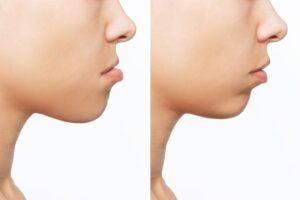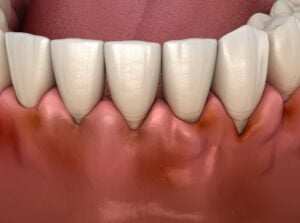-
How Tobacco Ruins Your Teeth
Everyone knows smoking is a bad habit, but do you understand the toll it takes on your oral health? Whether you prefer cigarettes, e-cigarettes, cigars, or smokeless tobacco, the effects can leave your teeth and gums in terrible shape. The good news is you can bounce back if you quit now and work with your dentist to restore your smile.
 Continue reading “How Tobacco Ruins Your Teeth”
Continue reading “How Tobacco Ruins Your Teeth” -
Can Your Dental Bite Affect Your Health?
Your tooth alignment might not seem like a big deal, but your dental bite can affect your health more than you probably realize. Learn about different types of bite issues, how they impact your daily life, and what can be done to fix them.
 Continue reading “Can Your Dental Bite Affect Your Health?”
Continue reading “Can Your Dental Bite Affect Your Health?” -
Should I Get Veneers?
Should I Get Veneers in NYC?
Are you considering a smile makeover? Dental veneers might be the perfect way to transform your grin. These thin, custom-made shells bond to the front of your teeth, concealing imperfections and enhancing your appearance. But are veneers the right option for you? Let’s find out.
 Continue reading “Should I Get Veneers?”
Continue reading “Should I Get Veneers?” -
8 Tips for Healthy Teeth in 2025

A healthy smile never goes out of fashion. If you’re looking to take better care of your teeth in 2025, follow these eight tips to promote great oral health this year. Continue reading “8 Tips for Healthy Teeth in 2025”
-
Understanding the Stages of Gum Disease: From Gingivitis to Periodontitis
 The Importance of Understanding Gum Disease
The Importance of Understanding Gum DiseaseYou brush, you floss, you limit your sugar consumption, and you see your dentist twice a year. You do all this to avoid cavities and tooth decay, right? Well, yes and no. While tooth decay is a problem for oral health, gum disease is equally concerning. In fact, gum disease, also known as periodontal disease, can become a serious health concern if left unchecked. Continue reading “Understanding the Stages of Gum Disease: From Gingivitis to Periodontitis”
-
Can Probiotics Help with Bad Breath?
 The Problem of Bad Breath
The Problem of Bad BreathBad breath is something that affects everyone from time to time, but for many people, it can become a chronic problem. In fact, bad breath, also called halitosis, ranks just behind cavities and periodontal disease in the list of reasons why people see the dentist. Going to the dentist is a good move, because, while bad breath can be the result of eating food like garlic, it can also be an indicator of oral issues like gum disease, cavities, and dry mouth. Your dentist can help rule these causes out, and may refer you to your primary care physician if there are concerns about health conditions that can cause bad breath, like diabetes or kidney disease. For most people, though, halitosis is caused by a blend of gases produced by mouth bacteria. Understanding that, scientists have begun to focus on using probiotics to help solve the problem of bad breath. Continue reading “Can Probiotics Help with Bad Breath?”
-
Detecting Dental Issues Early: The Importance of Regular Checkups
 The Importance of Early Intervention
The Importance of Early InterventionDoes the recommendation of twice yearly checkups seem like overkill to you? It’s not. Regular dental visits give the dentist a chance to become familiar with your mouth, and notice any changes in your oral health. That way, small problems can be addressed before they become major issues. From tooth decay to gum disease, dental issues that are detected early can be managed before they become difficult and expensive to treat. Continue reading “Detecting Dental Issues Early: The Importance of Regular Checkups”
-
The Impact of Stress on Oral Health
 Stress and Your Oral Health
Stress and Your Oral HealthYou probably know that stress can negatively impact your health, with chronic stress manifesting in a wide variety of health conditions. From disturbing your sleep to increasing your risk of heart attack or stroke, the results of poorly managed stress are a problem for your whole body. Did you know that stress also has a negative impact on your oral health? Continue reading “The Impact of Stress on Oral Health”
-
Choosing the Right Toothbrush and Toothpaste
 When it comes to the tools you are choosing to use for your oral hygiene, you want to make sure you select the absolute best. After all, your toothbrush and toothpaste are all you’ve got for cleaning your teeth, mouth, and gums. With so many options available, how do you find the best possible cleaning tools to enhance and clean your beautiful smile? The experts at Park 56 Dental can help you understand what to look for when choosing these important tools. Let’s break it down and examine the criteria you’re looking for.
When it comes to the tools you are choosing to use for your oral hygiene, you want to make sure you select the absolute best. After all, your toothbrush and toothpaste are all you’ve got for cleaning your teeth, mouth, and gums. With so many options available, how do you find the best possible cleaning tools to enhance and clean your beautiful smile? The experts at Park 56 Dental can help you understand what to look for when choosing these important tools. Let’s break it down and examine the criteria you’re looking for.Continue reading “Choosing the Right Toothbrush and Toothpaste”
-
How to Handle Dental Issues When You’re Traveling for the Holidays
 The upcoming holidays are an excellent time to travel, visit family and friends, and relax. But what happens if a dental issue springs up while you’re not at home? This kind of emergency can cause total panic. Are there ways to handle dental issues while you’re traveling? Are there ways to avoid dental problems? Here are some tips on how to handle dental issues while traveling.
The upcoming holidays are an excellent time to travel, visit family and friends, and relax. But what happens if a dental issue springs up while you’re not at home? This kind of emergency can cause total panic. Are there ways to handle dental issues while you’re traveling? Are there ways to avoid dental problems? Here are some tips on how to handle dental issues while traveling.Continue reading “How to Handle Dental Issues When You’re Traveling for the Holidays”
RECENT POSTS
categories
- Uncategorized
- Cosmetic Dentistry
- Veneers
- Healthier Teeth
- Teeth Whitening
- Dental Health
- Video
- Dental Emergencies
- Invisalign
- Dental Implants
- Root Canal
- Sedation Dentistry
- Infographic
- Dental Crowns and Bridges
- Dental Anxiety
- Gum Disease
- COVID-19
- Bad Breath
- New York Dentist
- Cut out sugar
- General Dentistry
- Oral Health
- Oral Cancer
- Dry Mouth
- Gum Health
- Toothache
- Dental Sealants
- Cavities



